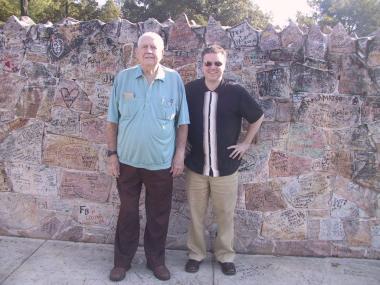Someone very important to me died unexpectedly last week. Harris Mills was a veteran of two of the bloodiest battles of the Pacific during World War II, Guadalcanal and the under-reported battle for the tiny island of Peleliu. I first met him when I was a kid living in Mississippi, and he became a stand-in of sorts for the grandfathers I never knew.
The reason I bring Sgt. Mills up in a public way, however, is not merely because he was important to me or because he was a witness to terrifying historical events, but rather because thinking back upon his epic life (which went right on being epic after the war) is stewing up thoughts about the importance of stories, something bigger even than the grief of an important passing. Perhaps I'm overreaching, but I really don't think so: isn't story how people weave the fabric of shared identity and cultural memory?
Harris Mills was, with his enormous voice and animated Memphis style, a natural storyteller. Sitting on his back porch by the hummingbird feeder, I heard him render stories large and small, from popping his eyeball out when he fled a Japanese marine and ran into a palm tree to winding up a German rocket scientist post-war who wanted to know how to cook a carp (Harris' intentionally long-winded description of the cooking method involved tacking the fish to a board, baking for one hour, then eating the board).
Hearing those stories stirs something almost primal. Even though I'm a longtime Valley resident and I left most of my accent somewhere on I-81 near the Mason-Dixon, I still can't say certain words without sounding like a Texan. Hearing Harris Mills careen through a tale with his Memphis drawl sounds like home to me, sounds like iced tea on a humid afternoon. Few things make me more completely aware that I am a Southerner than hearing a voice like his.
And that's just it—the sense of a cultural home is a shared memory, and its natural medium, surely, is the spinning of yarns that make context and history more tangible. Harris explained the world in story. When I got directions from him once, he tripped up on the name of an intersection near his home just south of Memphis in Horn Lake, Miss. Seems it had been changed from "Lynchburg corner" to something free of bad connotations, and Harris launched into an explanation that sprouted subnarratives, each of which connected to other people and places. His map was not geography, but story, and its intersections were unique bloomings of humor or poignancy. Google Earth hasn't dented it yet.
A lot of people tell stories, and a lot of them lapse into tedium. But for Harris, even the story of roads meeting in Lynchburg went somewhere compelling. He wanted to share the contours of his world, and he generously did just that. He wouldn't have explained why in terms of cultural anything, but he seemed to recognize fellow travellers and send them on their way laden with unexpected treats. Much of his life is an unknown to me even now, but largely because of him, I've come to believe art is almost always an attempt to weave the threads of narrative. Harris Mills just weaved his in a particularly direct way because his life put him at the center of some very big stories.
I'm reminded of lines from the very fine short piece by Jorge Luis Borge called "The Witness," about a dying Saxon: "Before dawn he will die, and in him will die, never to return, the last eye-witness of those pagan rites; the world will be a little poorer when this Saxon dies. Events far-reaching enough to people all space, whose end is nonetheless tolled when one man dies, may cause us wonder. But something, or an infinite number of things, dies in every death, unless the universe is possessed of a memory, as the theosophists have supposed."
I've been on a quest for several years to save some of Harris' stories from leaving with him, and thank heavens I succeeded. I've got a couple of hours' worth or more recorded, and some of it I've set to music, because his tales seemed to demand a creative response. You can hear some of his storytelling at the top of this page, and there is more online here.



